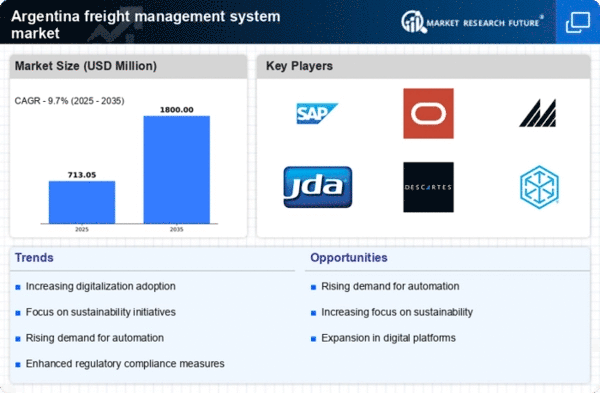E-commerce Growth
The rapid expansion of e-commerce in Argentina is a pivotal driver for the freight management-system market. As online shopping continues to gain traction, logistics and freight services are increasingly required to meet consumer demands. In 2025, e-commerce sales in Argentina are projected to reach approximately $10 billion, indicating a robust growth trajectory. This surge necessitates efficient freight management systems to handle increased shipment volumes and ensure timely deliveries. Consequently, businesses are investing in advanced freight management solutions to optimize their supply chains, enhance customer satisfaction, and remain competitive in a crowded marketplace. The freight management-system market is thus positioned to benefit significantly from this e-commerce boom, as companies seek to streamline operations and improve logistics efficiency.
Rising Fuel Costs
The fluctuation of fuel prices in Argentina significantly impacts the freight management-system market. With fuel costs representing a substantial portion of logistics expenses, companies are compelled to seek innovative solutions to mitigate these rising costs. In 2025, fuel prices are projected to increase by approximately 15%, prompting businesses to optimize their freight operations. Advanced freight management systems can provide analytics and route optimization features that help reduce fuel consumption and improve overall efficiency. This trend indicates a growing reliance on technology to manage costs effectively, positioning the freight management-system market as a vital component in the logistics strategy of many companies.
Increased Competition
The competitive landscape in Argentina's logistics sector is intensifying, driving demand for sophisticated freight management systems. As more players enter the market, companies are compelled to differentiate themselves through enhanced service offerings and operational efficiency. The freight management-system market is witnessing a surge in demand for solutions that provide real-time tracking, inventory management, and data analytics. This competitive pressure encourages businesses to invest in technology that can streamline operations and improve customer service. As a result, the freight management-system market is likely to expand as companies seek to adopt innovative solutions that give them a competitive edge in a crowded marketplace.
Infrastructure Development
Ongoing infrastructure development in Argentina plays a crucial role in shaping the freight management-system market. The government has initiated various projects aimed at enhancing transportation networks, including roads, railways, and ports. For instance, the investment in the Buenos Aires port expansion is expected to increase cargo handling capacity by 30% by 2026. Improved infrastructure facilitates smoother logistics operations, reducing transit times and costs. As a result, freight management systems are becoming essential tools for companies to navigate these enhanced networks effectively. The freight management-system market is likely to experience growth as businesses adapt to these infrastructural advancements, seeking solutions that can leverage improved connectivity and efficiency.
Consumer Demand for Transparency
There is a growing consumer demand for transparency in logistics and freight operations in Argentina, which is influencing the freight management-system market. Customers increasingly expect real-time updates on their shipments, leading companies to adopt systems that provide visibility throughout the supply chain. This trend is particularly pronounced in sectors such as retail and food services, where timely delivery is critical. In response, businesses are investing in freight management solutions that offer tracking capabilities and detailed reporting features. This shift towards transparency not only enhances customer satisfaction but also drives the freight management-system market as companies strive to meet evolving consumer expectations.
















